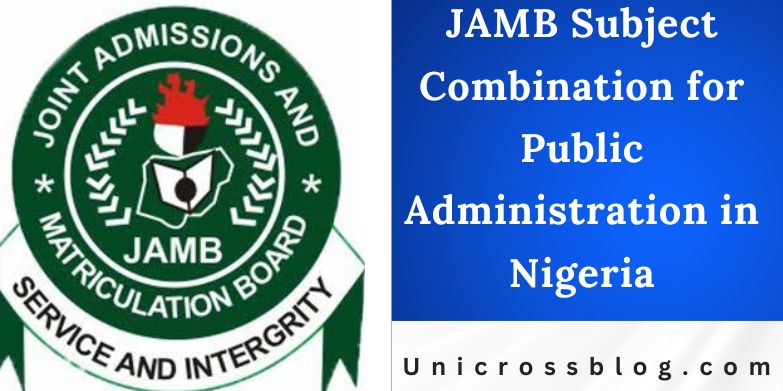Public Administration stands as a cornerstone of modern governance, equipping individuals with the skills to manage public resources, formulate policies, and lead organizations that serve society. In Nigeria, where the public sector plays a pivotal role in national development, studying Public Administration opens doors to careers in government agencies, civil service, non-profits, and international bodies. The course delves into topics like organizational behavior, public policy analysis, financial management, and ethical leadership, preparing graduates to tackle real-world challenges such as corruption, resource allocation, and service delivery in a diverse nation like Nigeria.
For aspiring students, securing admission into a Nigerian university to study Public Administration begins with the Joint Admissions and Matriculation Board (JAMB) examination. JAMB, established to regulate entry into tertiary institutions, requires candidates to select the correct subject combination to align with their chosen course. Choosing the wrong subjects can lead to automatic disqualification, no matter how high your scores are. This guide provides a comprehensive overview of the JAMB subject requirements for Public Administration, including UTME and Direct Entry options, O’Level prerequisites, and practical tips for success. Whether you are a fresh secondary school leaver or a Direct Entry candidate, understanding these elements is crucial for a smooth application process.
Public Administration is typically housed in the Faculty of Social and Management Sciences or Administration in most universities. It is a four-year program for UTME candidates and three years for Direct Entry students. The curriculum emphasizes analytical thinking, ethical decision-making, and practical administrative skills, making it ideal for those passionate about public service. With Nigeria’s growing emphasis on good governance and sustainable development, demand for qualified public administrators remains high. Graduates often find roles in ministries, local governments, parastatals, and even private consulting firms focused on policy advisory.

JAMB UTME Subject Combination for Public Administration
The UTME subject combination for Public Administration is designed to test candidates’ aptitude in areas relevant to administrative roles. The required subjects are:
-
English Language (compulsory)
-
Mathematics
-
Economics
-
Government
This quartet of subjects reflects the interdisciplinary nature of Public Administration. English ensures proficiency in report writing and policy documentation. Mathematics hones quantitative skills essential for budgeting and data analysis in public finance. Economics provides insights into resource allocation and fiscal policy, while Government covers constitutional frameworks, political systems, and administrative theories, which are central to the course.
Why this combination? Public Administration involves managing public funds, understanding economic policies, and navigating political landscapes. For instance, in policy formulation, economic principles help evaluate the impact of initiatives like subsidies or infrastructure projects, while government knowledge aids in interpreting laws and electoral processes. Universities like the University of Nigeria, Nsukka (UNN) and Lagos State University (LASU) strictly adhere to this, but alternatives like History or Commerce may be accepted by some institutions in place of Government or Economics.
Candidates should aim for balanced preparation across these subjects. In the UTME, each paper is scored out of 100, contributing to a total aggregate used for admission. A minimum UTME score of 180 is generally required, but competitive programs often demand 200 or higher. Practice past questions to master the format, focusing on essay writing in English and problem-solving in Mathematics.
O’Level Requirements
Admission into Public Administration also hinges on your Senior Secondary Certificate Examination (SSCE) results, whether from WAEC, NECO, or GCE. You need at least five credit passes in relevant subjects, obtained in not more than two sittings. The standard O’Level requirements are:
-
English Language
-
Mathematics
-
Economics
-
Government
-
Any other Arts or Social Science subject (such as Commerce, History, or Civic Education)
These credits validate your foundational knowledge. English and Mathematics are non-negotiable, as they underpin all administrative tasks. Economics and Government build directly on the UTME subjects, ensuring continuity. The fifth subject adds flexibility; for example, Commerce is useful for understanding business-government interactions, while History provides context on Nigeria’s administrative evolution from colonial times to the federal structure today.
If you have a pending result in one subject, some universities allow awaiting results during application, but confirm all credits before matriculation. A weak O’Level profile can disqualify you even with a stellar UTME score, so prioritize these subjects in secondary school.
Direct Entry Requirements
For candidates seeking Direct Entry (DE) into 200 level, bypassing the first year, JAMB requires evidence of advanced qualifications alongside O’Level credits. The typical DE requirements for Public Administration are:
-
Two ‘A’ Level passes in Government and Economics, or in Government and any one of History, Geography, or Accounting
-
ND/HND in Public Administration or related fields from accredited polytechnics, with Upper Credit
‘A’ Level passes are usually from IJMB, JUPEB, or Cambridge GCE. These programs bridge secondary and university education, allowing mature candidates or those with diplomas to advance. For ND holders, your polytechnic transcript must show relevance, such as courses in administrative law or public finance.
DE candidates apply through JAMB and the institution’s portal, often undergoing a screening. This route suits working professionals or those upgrading from related diplomas, reducing study time and costs. However, competition remains fierce, so strong grades are essential.
Tips for Success in JAMB and Beyond
Preparing for JAMB requires discipline. Create a study timetable, allocating time to each subject. Use recommended textbooks like “Essential Mathematics” for quant skills and “Round-Up Government” for political concepts. Join study groups to discuss policy scenarios, simulating real administrative debates.
Beyond admission, build extracurriculars: Volunteer in community projects or student unions to gain practical experience. Aim for a high Post-UTME score, as many universities use it for final ranking.
In Nigeria’s dynamic public sector, Public Administration graduates are vital for reforms. With dedication, you can contribute to efficient governance and societal progress.
READ ALSO: Updated JAMB Subject Combination for Architecture 2025
FAQs
What is the exact JAMB subject combination for Public Administration?
English Language, Mathematics, Economics, and Government.
Can I replace Economics with Commerce in UTME?
Yes, some universities accept Commerce as an alternative to Economics, but confirm with your target institution.
What if I don’t have a credit in Government in O’Level?
You can use History or Civic Education as a substitute in the fifth subject slot, but Government is highly recommended.
Which universities offer Public Administration in Nigeria?
Top options include UNN, LASU, UNIZIK, and Ahmadu Bello University, among others.
What is the minimum JAMB score for Public Administration?
Generally 180, but aim for 200+ for competitive universities.
Can I study Public Administration via Direct Entry with an ND?
Yes, with Upper Credit in a related field like Business Administration.
How does Public Administration differ from Political Science?
Public Administration focuses on management and policy implementation, while Political Science emphasizes theory and politics.







